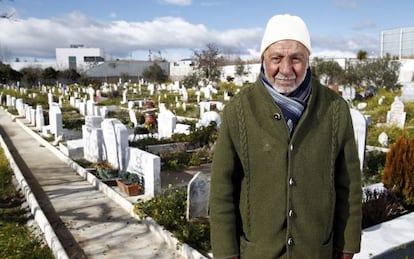Why Spain’s Muslims are seeking more grave sites
The community wants to restart burying its dead according to Islamic rites in Madrid Andalusia is the only region to currently allow burials without coffins


Over the years, Mohamed Riani has laid hundreds of Muslims to rest at the municipal cemetery in Griñón, in the south of Madrid, following the Islamic tradition of placing the deceased on their right side, their head directed toward Mecca, and wrapped only in a winding sheet, without a coffin.
Griñon is the only Islamic cemetery in the Madrid region, the area with the largest number of Muslims in Spain: 200,000. For more than 70 years the small community’s graveyard has also been the chosen burial place of Muslims from all over Spain because it permitted interment without a coffin as required by the Koran, and did so at minimum cost. But since the cemetery came under the control of the local council in October 2014, Islamic burials are now subject to the same conditions as all others: the dead must be placed in caskets, and funerals have fixed prices. Representatives of Spain’s Muslim community say this contravenes agreements made between the Spanish state and the country’s main religions two decades ago.
We have the right to a place to bury our loved ones according to our beliefs” Hicham Oulad, secretary general of the Young Muslims of Spain
The issue has highlighted the increasing mistrust between the Spanish authorities and the country’s Muslim community, as well as illustrating the growing assertiveness of younger Muslims in the fight for what they see as their rights. “In the same way that we have a right to a roof over our heads, we also have the right to a place to bury our loved ones according to our beliefs. We are a deep-rooted part of the history of Spain,” says Hicham Oulad, secretary general of the Young Muslims of Spain, pointing out that his grandfather and great grandfather fought in the Spanish Civil War. “I feel as Spanish as any other Spaniard. But people think that we have nothing to do with this country. We do not beg for money. Instead, we demand our rights and compliance with the agreements by the state with our religion.”
There are 22 cemeteries in Spain with areas set aside for Muslims. Eight are in Andalusia, the only region that allows burials without a coffin. Until now this was permitted in Griñón, where Muslims from northern, western, and central Spain, where there are no Islamic cemeteries, were buried. In the rest of Spain, Muslims are buried in coffins, which are usually adapted by drilling holes in them so the body can be said to be in contact with the earth, in keeping with Islamic burial rites. Prices of interments vary considerably.
The cemetery at Griñón was created during the Spanish Civil War to bury Moroccan troops fighting for the forces of General Francisco Franco. But in October, the Ministry of Defense, which owned the land, suddenly announced it was ceding the graveyard to the local council of Griñón, which immediately closed it, albeit temporarily, saying it needed to carry out maintenance work to bring it into line with the law, and prompting the cancellation of several funerals.
In contact with the earth
The religious precept of burial without a coffin is based on an interpretation of verse 55 of chapter 20 of the Koran: “From the earth We created you, and into it We will return you, and from it We will extract you another time.” But the practice goes against Madrid’s burial laws, which require the deceased to be placed in a coffin. Inés Bermejo, Griñón’s health councilor, says the town has no option but to follow the law.
Representatives of Spain’s Muslim community point to Andalusia, where legislation allows for bodies to be buried without a coffin for religious reasons, providing there is no health risk. A spokesman for the regional government of Madrid’s health department dismissed any possibility of a change to the law: “We’re not going to change the law unless it is done at national level. We’re not going to do anything unilaterally.”
By late December, with no solution in sight, organizations representing Spain’s Muslims had organized demonstrations outside Griñón town hall demanding action.
In response, the local council reopened the cemetery and hastily organized several funerals. Griñón’s mayor, María Antonia Díaz, announced that the town was to clean up the site, by placing an olive tree and laying a Defense Ministry plaque to commemorate all those who fell in the Civil War.
In 1992, the Spanish state announced a cooperation agreement with the country’s main religions saying it would “adopt the opportune measures for the observance of traditional Islamic rules relating to inhumations, burials and funerary rites.” Aside from regulations requiring the dead to be buried in coffins, organizations representing Muslims say they are concerned about the cement walls put up around the provisional graves, which they say are a barrier between the deceased and the earth. “They cannot bury us like everybody else,” says Mounir Benjelloun, president of the Spanish Federation of Islamic Religious Entities, which has been negotiating in the dispute in Griñon, and highlights the willingness of all parties concerned to find a solution.
Until now, Muslims wishing to bury their loved ones in Griñón paid Riani around €100. They will now have to pay a standard fee of €1,960 for a 10-year period in a grave along with a further €1,500 for funeral arrangements. Mohamed El Hichou of the Al Sunna mosque in the Madrid dormitory town of Fuenlabrada says many Muslims will now find it cheaper to repatriate the bodies of deceased family members.
Fernando Arias, the director of the Pluralism and Coexistence Foundation, which is funded by the Ministry of the Interior, and was also involved in the negotiations in Griñón, argues that if Muslims want the same rights as other Spaniards, “they should pay the same.”
He adds: “There should be more Muslim cemeteries in Spain, which would give them more choice, like other Spaniards. In 10 years, those born here are not going to want to repatriate the bodies of their parents, and there will be a lot more burials.” Of the 22 provisional graves that the authorities in Griñón dug in December, six have been filled, and the remainder will be occupied within two months. Around 180 people are buried at the cemetery each year.
Riani sits in the cafeteria of a municipal mortuary in the outskirts of Madrid. He has just finished preparing the body of Abdel, who died shortly after birth, for burial. In three days, Abdel’s body will be flown to Morocco for burial. His father was advised not to inter his son in Griñón, where in 10 years he was warned it would be dug up and thrown into a common grave. Better off in Morocco, he thought.
Tu suscripción se está usando en otro dispositivo
¿Quieres añadir otro usuario a tu suscripción?
Si continúas leyendo en este dispositivo, no se podrá leer en el otro.
FlechaTu suscripción se está usando en otro dispositivo y solo puedes acceder a EL PAÍS desde un dispositivo a la vez.
Si quieres compartir tu cuenta, cambia tu suscripción a la modalidad Premium, así podrás añadir otro usuario. Cada uno accederá con su propia cuenta de email, lo que os permitirá personalizar vuestra experiencia en EL PAÍS.
¿Tienes una suscripción de empresa? Accede aquí para contratar más cuentas.
En el caso de no saber quién está usando tu cuenta, te recomendamos cambiar tu contraseña aquí.
Si decides continuar compartiendo tu cuenta, este mensaje se mostrará en tu dispositivo y en el de la otra persona que está usando tu cuenta de forma indefinida, afectando a tu experiencia de lectura. Puedes consultar aquí los términos y condiciones de la suscripción digital.








































